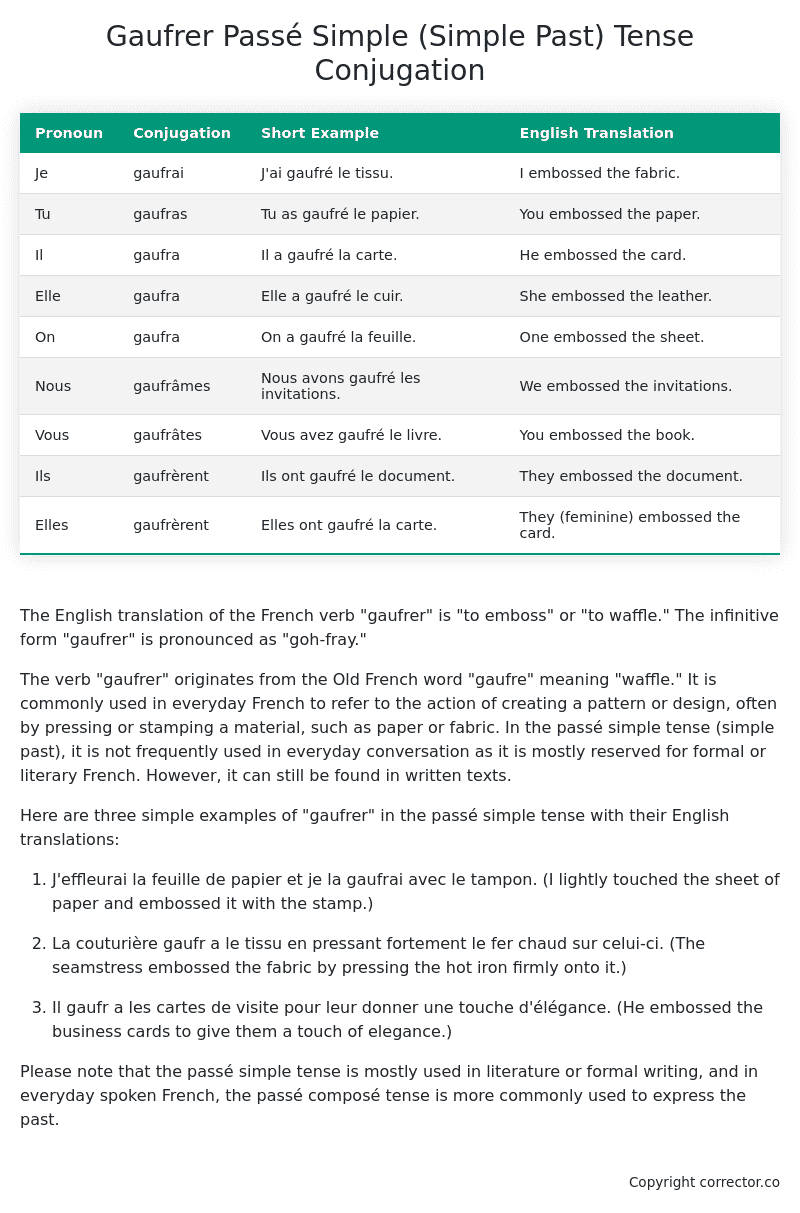Passé Simple (Simple Past) Tense Conjugation of the French Verb gaufrer
Introduction to the verb gaufrer
The English translation of the French verb “gaufrer” is “to emboss” or “to waffle.” The infinitive form “gaufrer” is pronounced as “goh-fray.”
The verb “gaufrer” originates from the Old French word “gaufre” meaning “waffle.” It is commonly used in everyday French to refer to the action of creating a pattern or design, often by pressing or stamping a material, such as paper or fabric. In the passé simple tense (simple past), it is not frequently used in everyday conversation as it is mostly reserved for formal or literary French. However, it can still be found in written texts.
Here are three simple examples of “gaufrer” in the passé simple tense with their English translations:
-
J’effleurai la feuille de papier et je la gaufrai avec le tampon.
(I lightly touched the sheet of paper and embossed it with the stamp.) -
La couturière gaufr a le tissu en pressant fortement le fer chaud sur celui-ci.
(The seamstress embossed the fabric by pressing the hot iron firmly onto it.) -
Il gaufr a les cartes de visite pour leur donner une touche d’élégance.
(He embossed the business cards to give them a touch of elegance.)
Please note that the passé simple tense is mostly used in literature or formal writing, and in everyday spoken French, the passé composé tense is more commonly used to express the past.
Table of the Passé Simple (Simple Past) Tense Conjugation of gaufrer
| Pronoun | Conjugation | Short Example | English Translation |
|---|---|---|---|
| Je | gaufrai | J’ai gaufré le tissu. | I embossed the fabric. |
| Tu | gaufras | Tu as gaufré le papier. | You embossed the paper. |
| Il | gaufra | Il a gaufré la carte. | He embossed the card. |
| Elle | gaufra | Elle a gaufré le cuir. | She embossed the leather. |
| On | gaufra | On a gaufré la feuille. | One embossed the sheet. |
| Nous | gaufrâmes | Nous avons gaufré les invitations. | We embossed the invitations. |
| Vous | gaufrâtes | Vous avez gaufré le livre. | You embossed the book. |
| Ils | gaufrèrent | Ils ont gaufré le document. | They embossed the document. |
| Elles | gaufrèrent | Elles ont gaufré la carte. | They (feminine) embossed the card. |
Other Conjugations for Gaufrer.
Le Present (Present Tense) Conjugation of the French Verb gaufrer
Imparfait (Imperfect) Tense Conjugation of the French Verb gaufrer
Passé Simple (Simple Past) Tense Conjugation of the French Verb gaufrer (You’re reading it right now!)
Passé Composé (Present Perfect) Tense Conjugation of the French Verb gaufrer
Futur Simple (Simple Future) Tense Conjugation of the French Verb gaufrer
Futur Proche (Near Future) Tense Conjugation of the French Verb gaufrer
Plus-que-parfait (Pluperfect) Tense Conjugation of the French Verb gaufrer
Passé Antérieur (Past Anterior) Tense Conjugation of the French Verb gaufrer
Futur Antérieur (Future Anterior) Tense Conjugation of the French Verb gaufrer
Subjonctif Présent (Subjunctive Present) Tense Conjugation of the French Verb gaufrer
Subjonctif Passé (Subjunctive Past) Tense Conjugation of the French Verb gaufrer
Subjonctif Imparfait (Subjunctive Imperfect) Tense Conjugation of the French Verb gaufrer
Subjonctif Plus-que-parfait (Subjunctive Pluperfect) Tense Conjugation of the French Verb gaufrer
Conditionnel Présent (Conditional Present) Tense Conjugation of the French Verb gaufrer
Conditionnel Passé (Conditional Past) Tense Conjugation of the French Verb gaufrer
Conditionnel Passé II (Conditional Past II) Tense Conjugation of the French Verb gaufrer
L’impératif Présent (Imperative Present) Tense Conjugation of the French Verb gaufrer
L’impératif Passé (Imperative Past) Tense Conjugation of the French Verb gaufrer
L’infinitif Présent (Infinitive Present) Tense Conjugation of the French Verb gaufrer
L’infinitif Passé (Infinitive Past) Tense Conjugation of the French Verb gaufrer
Le Participe Présent (Present Participle) Tense Conjugation of the French Verb gaufrer
Le Participe Passé (Past Participle) Tense Conjugation of the French Verb gaufrer
Struggling with French verbs or the language in general? Why not use our free French Grammar Checker – no registration required!
Get a FREE Download Study Sheet of this Conjugation 🔥
Simply right click the image below, click “save image” and get your free reference for the gaufrer Passé Simple tense conjugation!

Gaufrer – About the French Passé Simple (Simple Past) Tense
Formation
Usage
Narration
Historical Context
Interactions with other tenses
Passé Composé
Imparfait
Conditional and Subjunctive
Summary
I hope you enjoyed this article on the verb gaufrer. Still in a learning mood? Check out another TOTALLY random French verb conjugation!


